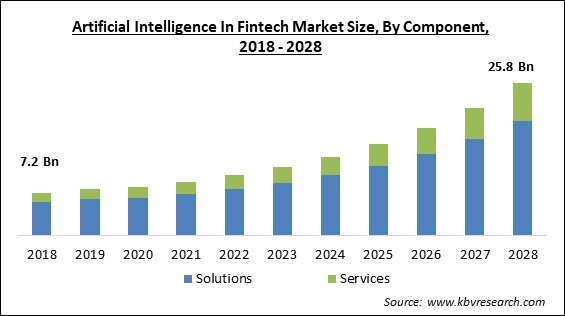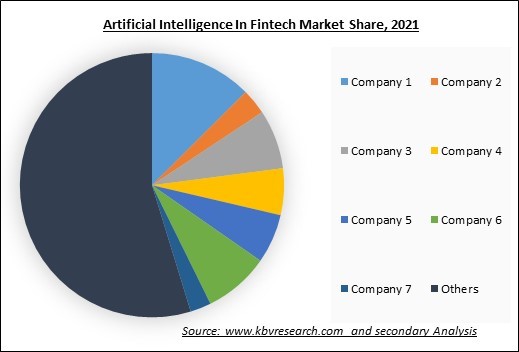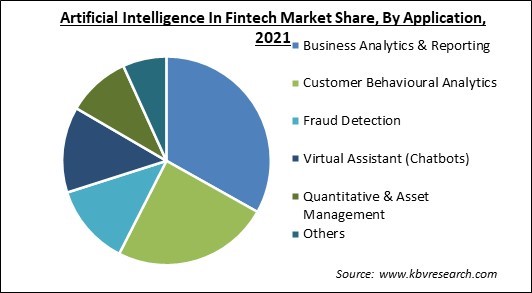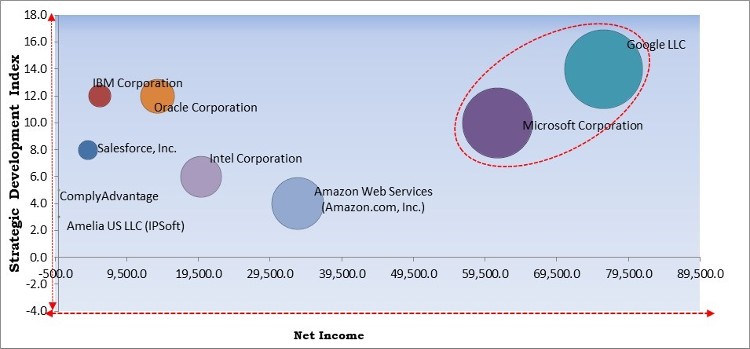The Global Artificial Intelligence In Fintech Market size is expected to reach $25.8 billion by 2028, rising at a market growth of 16.8% CAGR during the forecast period.
Insurance executives and future banking agents would ask the proper questions to robots rather than human experts as a result of data-driven management decisions at a reduced cost. Machines would then analyze the data and provide recommendations that will aid leaders and subordinates in making better decisions. Users can employ automated financial assistants and planners to help them make financial decisions. These include events tracking, stock and bond price trends based on the user's financial goals and personal portfolio, that can aid in the recommendation of bonds and stocks to buy or sell. These systems, dubbed "Robo-Advisors," are highly being provided by both traditional financial firms and Fintech startups.

Bright well Payments, a financial services firm that offers financial solutions to transport money safely anywhere in the world, announced the launching of ARDEN in May 2022. This risk-detection engine powered by AI helps fintech companies protect their cardholders and financial assets. Globally, banks are implementing AI-enabled solutions to enhance safety, and AI provides banks the advantage of digitization. Additionally, it enables them engage with other fintech businesses. Apps that necessitate UPI, a fingerprint, or facial recognition are available from financial institutions.
UPI is one of the most widely used digital payment systems in India, and the system was created to enable payments to be executed in seconds. To generate critical insights, financial firms utilize AI to handle and assess data from a variety of sources. Banks might use such inventive solutions to solve challenges they have when providing services like payment processing and loan management. Many banking apps offer personalized financial advice to assist users in achieving their financial goals, tracking their income & expenditures, and performing other financial chores. AI-powered finance advances are primarily responsible for this customization.
The latest coronavirus outbreak has been beneficial to the market. Due to the coronavirus pandemic, business activity has been halted, resulting in disruptions in border restrictions, supply chains, and travel restrictions imposed by government bodies. As a result, banks and fintech companies are adopting a work-from-home attitude. Moreover, banks and financial institutions are implementing AI technologies to extract information and insights from unstructured documents and automate the laborious procedure that banks have traditionally completed in shorter period of time. For example, Temenos, a banking software business, announced the introduction of eight propositions in April 2020, utilizing breakthrough Explainable AI (XAI) and cloud technologies to assist banks and financial institutions in responding to the COVID-19 situation.

The leading players in the market are competing with diverse innovative offerings to remain competitive in the market. The below illustration shows the percentage of revenue shared by some of the leading companies in the market. The leading players of the market are adopting various strategies in order to cater demand coming from the different industries. The key developmental strategies in the market are Partnerships & Collaborations.
Artificial intelligence in fintech is enabling businesses to minimize costs, automate processes, and lessen the risk of human mistake. Companies utilize AI Chatbots as customer assistants for a variety of tasks, including sales, customer service (over the phone), and online chat. AI is enabling small finance organizations since it is cost-effective and has a minimal risk of error. Furthermore, the end user is gaining momentum for the insightful facts regarding cash flow, income, and expense, as this would assist organizations cut their expenses. Lesser net worth market groups are provided digital and wealth management advice services, leading to low fee-based commissions.
Credit card fraud is one of the most common types of cybercrime. As a result, firms are developing the next-generation of algorithms called Convolutional Neural Networks, which are based on the visual cortex, a small portion of cells in the human body that is sensitive to particular regions of the visual field. They can extract basic visual elements such as aligned edges, end-points, and corners in this way. This system can analyze an individual's funding data and establish whether they made the most recent credit card transaction or if their credit card data was used by someone else based on that data.
Most fintech businesses are dealing with the sensitive topic of data privacy and security that is the largest hurdle with AI. Because any data breach or security failure might be disastrous, the fintech sector is overseen by tight adherence to standards and governance. Since businesses nourish more and more user and provider information into advanced, AI-fueled algorithms, innovative bits of personal data are created without the knowledge of the way it affected clients and employees, which ultimately leads to the rising privacy concerns. This is especially true in the retail banking industry, in which the collection of consumer data is at the forefront of big data challenges.

Based on Component, the market is segmented into Solutions and Services. The solution segment procured the highest revenue share in the Artificial Intelligence In Fintech Market in 2021. The high proportion can be due to software tools, which help banks adopt AI-enabled solutions that extract correct and comprehensive data from large amounts of data in a timely manner. Some firms' solutions help them accomplish things like develop their retail banking company with next-best-action software, identify and battle financial fraud, and improve client relationships with multichannel user experience solutions.
Based on Deployment, the market is segmented into On-premise and Cloud. The cloud segment garnered a substantial revenue share in the Artificial Intelligence In Fintech Market in 2021. From 2022 to 2030, the cloud segment will grow at the quickest rate. AI-based algorithms that learn from historical data in a public cloud, detect current norms, and make recommendations are credited with the increase. In data handling and authenticity, the cloud and AI may boost efficiency, and digital security, and this automated technique removes human errors throughout data processing.
Based on Application, the market is segmented into Business Analytics & Reporting, Customer Behavioral Analytics, Fraud Detection, Virtual Assistant (Chatbots), Quantitative & Asset Management and Others. Business Analytics and Reporting segment witnessed the maximum revenue share in the Artificial Intelligence In Fintech Market in 2021. Regulatory and compliance management, as well as customer behaviour monitoring, benefit from business analytics and reporting. More efficiency, more educated decision, and higher revenues are all elements that have contributed to the segment's growth.
| Report Attribute | Details |
|---|---|
| Market size value in 2021 | USD 9 Billion |
| Market size forecast in 2028 | USD 25.8 Billion |
| Base Year | 2021 |
| Historical Period | 2018 to 2020 |
| Forecast Period | 2022 to 2028 |
| Revenue Growth Rate | CAGR of 16.8% from 2022 to 2028 |
| Number of Pages | 249 |
| Number of Tables | 363 |
| Report coverage | Market Trends, Revenue Estimation and Forecast, Market Share Analysis, Segmentation Analysis, Regional and Country Breakdown, Competitive Landscape, Companies Strategic Developments, Company Profiling |
| Segments covered | Component, Application, Deployment, Region |
| Country scope | US, Canada, Mexico, Germany, UK, France, Russia, Spain, Italy, China, Japan, India, South Korea, Singapore, Malaysia, Brazil, Argentina, UAE, Saudi Arabia, South Africa, Nigeria |
| Growth Drivers |
|
| Restraints |
|
Based on Regions, the market is segmented into North America, Europe, Asia Pacific, and Latin America, Middle East & Africa. North America emerged as a leading region in the Artificial Intelligence In Fintech Market with the largest revenue share in 2021. It is due to the industrialized economies of the United States and Canada placing a major focus on R&D-derived technologies. In fintech, this region has the most competitive and rapidly developing AI technology. Many startups and rising firms that provide AI services to the finance sector are also fueling the trend.
Free Valuable Insights: Global Artificial Intelligence In Fintech Market size to reach USD 25.8 Billion by 2028

The major strategies followed by the market participants are Partnerships. Based on the Analysis presented in the Cardinal matrix; Microsoft Corporation and Google LLC are the forerunners in the Artificial Intelligence In Fintech Market. Companies such as Oracle Corporation, Intel Corporation and IBM Corporation are some of the key innovators in the Market.
The market research report covers the analysis of key stake holders of the market. Key companies profiled in the report include IBM Corporation, Oracle Corporation, Microsoft Corporation, Google LLC, Intel Corporation, Salesforce.com, Inc., Amazon Web Services, Inc., ComplyAdvantage, Amelia US LLC, and Inbenta Technologies, Inc.
By Component
By Deployment
By Application
By Geography
The global artificial intelligence in fintech market size is expected to reach $25.8 billion by 2028.
Reduction in cost and better efficiency along with enhanced wealth management are driving the market in coming years, however, Data security and privacy concerns of the users limited the growth of the market.
IBM Corporation, Oracle Corporation, Microsoft Corporation, Google LLC, Intel Corporation, Salesforce.com, Inc., Amazon Web Services, Inc., ComplyAdvantage, Amelia US LLC, and Inbenta Technologies, Inc.
The expected CAGR of the artificial intelligence in fintech market is 16.8% from 2022 to 2028.
The On-premise segment is leading the Global Artificial Intelligence In Fintech Market by Deployment in 2021, thereby, achieving a market value of $13.2 billion by 2028.
The North America market dominated the Global Artificial Intelligence In Fintech Market by Region in 2021, and would continue to be a dominant market till 2028; thereby, achieving a market value of $10.3 billion by 2028.
Our team of dedicated experts can provide you with attractive expansion opportunities for your business.

